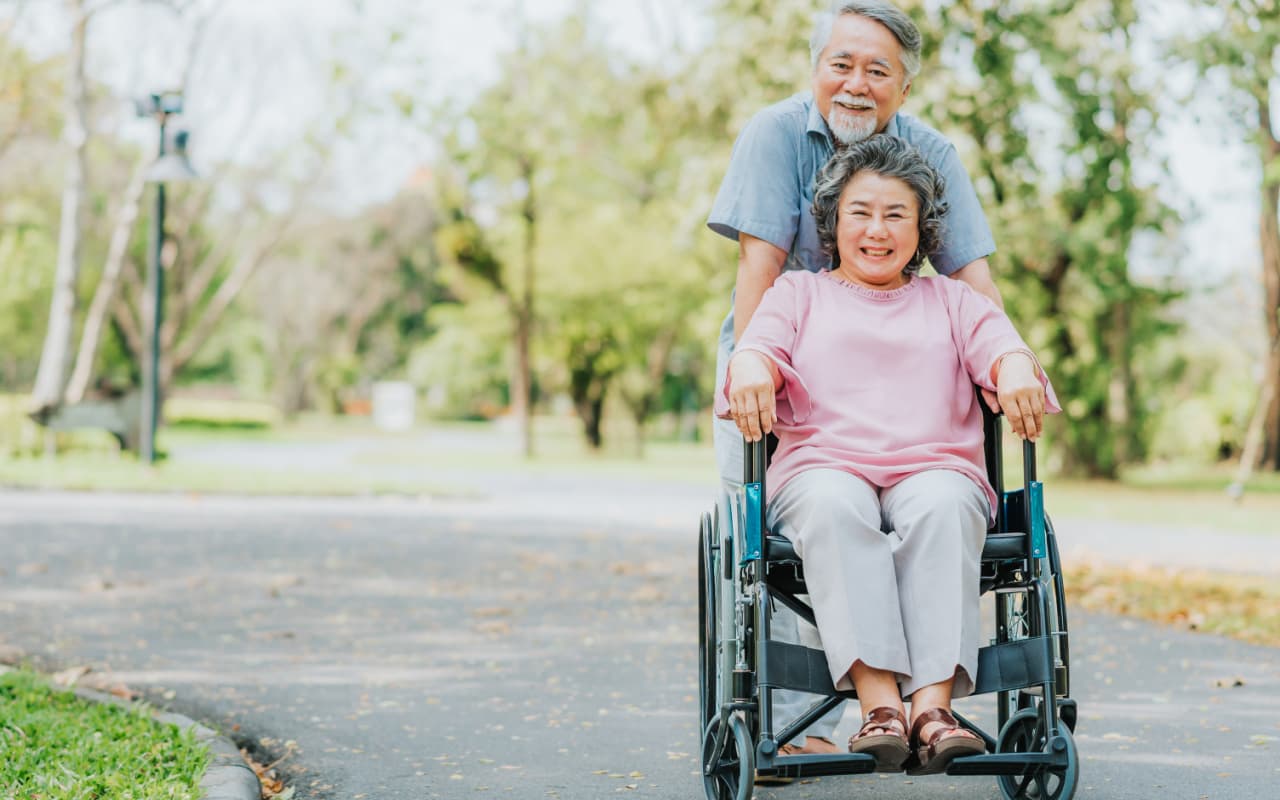May 8-15th is National Women’s Health Week, an event that encourages women to prioritize their mental and physical health. Considering that up to 75% of unpaid family caregivers are women, we wanted to share some helpful suggestions for supporting the caregiver (or caregivers) in your life.
To provide you with a wide range of insights and opinions, we reached out to a panel of caregiving experts, including:
Dr. Elizabeth Landsverk, a San Francisco-based geriatrician specializing in the treatment of dementia and Alzheimer’s and advising their families on ways to improve the caregiving process. Her new book, Living in The Moment: A Guide to Overcoming Challenges and Finding Moments of Joy in Alzheimer’s Disease and Other Dementias, is based on the most frequently asked questions posed in her telehealth and education sessions with caregivers on the frontlines.
Jessica Cording, MS, RD, CDN, INHC, a dietician, health coach, and author of The Farewell Tour: A Caregiver’s Guide to Stress Management, Sane Nutrition, and Better Sleep (Viva Editions). Cording has worked in ALS care and oncology and supported her own father during his battle with pancreatic cancer.
Tyler MacEachran, Executive director of the Alzheimer’s Caregivers Network, a non-profit organization that offers resources and support to family caregivers to those with Alzheimer’s Disease.
Marty Schreiber, former Governor of Wisconsin and author of My Two Elaines: Learning, Coping, and Surviving as an Alzheimer’s Caregiver which releases from Harper Horizon on June 13, 2022.
Melissa Williams, associate director of policy and field advocacy at the National Patient Advocate Foundation.
A HUGE thank you to our panel of experts for taking the time to answer our questions.
Below, you’ll find a list of tips and tricks for supporting the family caregiver in your life.
[Editor’s note: some quotes have been lightly edited for clarity.]
1) When offering support, be specific
If there's an unpaid caregiver in your life, it can be difficult knowing how to support them. You want to make things easier, but you don't want to overstep their boundaries. While it might be tempting to reach out and say something like, "could you use a hand?" It's better to take a direct approach
"Offer specific support," said Cording. "For example, offer to do specific tasks they may need help with, like running errands, waiting for a delivery, cleaning the house, walking their dog, or cooking some healthy meals. Just saying 'I'm here if you need me' isn't the most helpful. It puts pressure on the caregiver to tell you what they need."
Schreiber agrees. "'Call if I can help'" doesn't really do much for the caregiver. For some reason or another, we simply don't want to ask for help, even though it's critical for caregivers to get help.
The best way of helping is to offer assistance in specific areas—like going shopping, taking the loved one for a walk, or cutting the grass—anything specific that will give the caregiver more time and respite."
2) Have a caregiver-centric attitude
If you want to support the caregiver in your life, MacEachran says a caregiver-centric attitude is key.
"Caregivers are under a lot of stress trying to juggle too much. You should lead by recognizing that and applauding how well they’re doing."
Having a caregiver-centric attitude also means putting yourself in the caregiver's shoes.
"Friends and family members should learn about the disease so they can know how best to visit with the person who is ill," said Schreiber.
"For instance, know that it's not necessary for the person who is ill to remember your name in order for your hearts to touch. Hearts can touch through music, holding hands, singing, or playing simple games without rules."
At the same time, it's crucial "to simply acknowledge the caregiver—their situation, the heroics, the challenges,” Schreiber said.
3) Don’t give unsolicited advice
We all have ideas and opinions, but it's important to know when to share them.
"Please, please, please don't give unsolicited advice," said Cording. "There's a whole chapter in my book about the unhelpful, unsolicited comments and recommendations people shared with me when my dad was battling pancreatic cancer. I wished I had a neon sign over my head that said, 'Please don't talk to me about juicing.'"
Williams concurs, adding "try not to offer advice such as “be sure to take some time for yourself”, “practice self-care” or share how you handled or would handle a particular situation. While well-meaning, it’s off-putting and may likely lead to the caregiver retreating."
Instead, try a more positive approach.
"Caregivers need to feel supported and their experiences validated," said Williams. "So, saying something like 'I’m so sorry you’re going through this”' or even sharing in their feelings can be reassuring."
4) Be Mindful of Your Body Language and Actions
When you aren't the one who provides care, it can be tempting to share your own ideas and opinions. Though there's nothing wrong with giving advice, consider your body language and delivery when you do.
"Be careful not to minimize the caregiver's feelings by telling them to 'look on the bright side' or pointing out how others may have it worse," said Cording. "That can make caregiver guilt even worse. If you're not sure what to say, say just that!"
At the same time, Cording recommends keeping tabs on the caregiver in your life.
"If you notice they're struggling with self-care (for example, changes in their weight or appearance or they seem very distracted or irritable) offer to help in a specific way that's doable for you. Even a simple, "Hey, I'm making some soup, can I bring you any?" can go a long way."
5) Don’t let distance keep you from getting involved
If you live in a different state or city than the caregiver in your life, don't let that prevent you from helping out.
"You can support caregivers remotely as well," said MacEachran. "Setting up Zoom calls so the caregiver and their loved one can stay connected; creating a GoFundMe account for the family; doing online research for resources in their community; sending them dinner via GrubHub so the caregiver doesn’t have to meal plan every night . . . all these little touches can add up to significant relief."
You might also want to set up an online hub where friends and family members can check in.
"Some people find it helpful to use a website or blog where they can share updates with people who sign up," said Cording.
"Social media, while it can be a helpful tool for fostering connection, can also come with lots of mental health pitfalls, so I would make other forms of communication your primary go-to."
6) Don’t let awkward feelings prevent you from speaking up
Don't let uncertainty or self-doubt keep you from offering help.
"You shouldn’t let awkwardness stop you from engaging in conversations about how you might lend a hand to the caregivers in your life," said MacEachran.
"When I was young, my grandma was diagnosed with Alzheimer’s disease, and I watched my grandpa’s health deteriorate along with hers over the years. I think largely because he was insistent on taking everything on himself.
You might get shot down initially but keep letting the caregiver know you’re there for them and would love to help."
7) Let the Caregiver in your life be themselves
At the end of the day, informal caregivers are just like you. They're real people with hopes, fears, goals, and interests. Remember that above all else.
"Applauding their efforts regularly can help caregivers feel better mentally. Keeping in regular contact and talking about their interests outside of caregiving helps as well," said MacEachran.
"A lot of times, a caregiver’s support network shrinks, and they become more isolated as the disease progresses. A bit of “normal” and humorous conversation can be a welcome break in the day.
Feeling that love and connectivity is extremely important as well. Also, giving the caregiver freedom to vent or talk about their emotions and experiences in a safe, judgment-free relationship with you can be incredibly meaningful."
8) Consider bringing in professional help
If you see signs of burnout or exhaustion, consider bringing in professional help. That might mean joining a caregiver support program, enrolling in community support services, or hiring an experienced care manager.
"The addition of such a helper may make it easier to discuss difficult issues or alternatives," said Dr. Landsverk.
"For instance, an elder may be more open to the suggestion of hiring a financial manager if it comes from a “professional” rather than from a family member. If asked, care managers can give advice on eldercare issues most families find challenging, such as advance health directive choices or deciding when a dementia community is appropriate.”
At the same time, you shouldn't force the issue.
"It's no secret that caregivers try to do it all. It's further no secret that as the disease progresses, caregivers feel guilty that they're not doing a good enough job," said Schreiber. "The simple fact is, they may not be ready to realize that they need help and can't do it alone—but that's something they have to learn for themselves."



